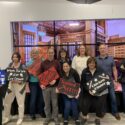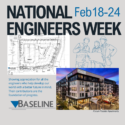 In 1951, the National Society of Professional Engineers founded Engineers Week to show appreciation towards engineers and the role they play in our communities. More than 70 years later it is still celebrated as engineers continue to be an integral part of our society. Engineering embeds into our lives to such an extent that it goes unnoticed in many ways. Engineering is all around us, from the roads we drive to see our friends to the buildings we call home. People live safer, easier, and more adventurous lives because of engineers. They transform concepts and ideas into practical applications for the betterment of all. Engineering stands as a pillar of hope in this chaotic, messy world. Take the time to appreciate engineers for their immeasurable contribution to the advancement of humanity.
In 1951, the National Society of Professional Engineers founded Engineers Week to show appreciation towards engineers and the role they play in our communities. More than 70 years later it is still celebrated as engineers continue to be an integral part of our society. Engineering embeds into our lives to such an extent that it goes unnoticed in many ways. Engineering is all around us, from the roads we drive to see our friends to the buildings we call home. People live safer, easier, and more adventurous lives because of engineers. They transform concepts and ideas into practical applications for the betterment of all. Engineering stands as a pillar of hope in this chaotic, messy world. Take the time to appreciate engineers for their immeasurable contribution to the advancement of humanity.
As National Engineers Week comes to a close, Baseline engineers were surveyed to provide some insight into their careers and here’s what they had to say.
Question: Why did you pursue a career in engineering?
Answers:
- Before I attended college, I helped build a wooden bridge which increased my interest in civil engineering.
- I started out in wildlife biology in college and was convinced that it was not going to be a stable career. So, I switched to engineering and my career is now in its 38th
- I wanted to apply my obsession with science/math to contribute to society.
Question: What is your favorite part about working at Baseline?
Answers:
- Having positive and intelligent teammates.
- I enjoy the people I work with and some of the extra activities.
- The staff, the flexible work schedule, and the ownership of my job and work.
- Freedom in how to tackle problems. Variety of different systems to work on.
- Laid back (social aspect) yet professional (quality of work).
Question: What new engineering skills have you developed since working at Baseline?
Answers:
- Lots of experience and practice with new industry software that I didn’t know about before.
- Hydraulic flow analysis.
- Better CAD skills, plan drafting, site design, utility layout and design.
- A lot more project manager skills.
- Learning how to work remotely and making “redlines” on pdfs and not with a red pencil.
- Specific land development skills I didn’t have before. drainage, water and sanitary design, grading, etc.
Question: Describe the most challenging part of being an engineer.
Answers:
- Professional engineers must hold paramount the health, safety and welfare of the general public. This can be challenging when working with clients and co-consultants.
- The constant change in work and constantly figuring out problems.
- You can always refine a design to be more efficient, cost effective, better at solving the problem, faster, easier to construct, etc. Knowing when to stop at an effective design that will accomplish what you need it to is not always a clear line. Sometimes these goals are aligned, and sometimes they are adversarial and a balance needs to be struck. There’s very rarely a “right” answer, but a number of acceptable ones.
- Helping all stakeholders understand the nature of the engineering challenges.
- Explaining design challenges in laymen’s terms.
Question: What is your greatest accomplishment here at Baseline?
Answers:
- Taking on some management roles that I wasn’t used to.
- Helping to open doors for work in new cities or towns we haven’t worked for.
- I think that all that I have learned here at Baseline has been my greatest accomplishment.
- Seeing designs that I worked on become a reality.
Thank you Baseline engineer teams for making a difference and contributing to your communities and to our company!



